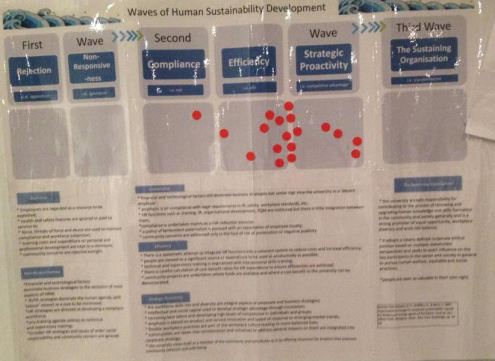Piantanida & Garman (1999) present a theory to expand the notion of qualitative inquiry to present it as a method and a logic of justification for the research study. Their theory makes explicit the notion of the ‘researcher as research instrument’ (other references to ‘researcher as research instrument’ include Guba & Lincoln, 1981 ; Shindler & Case, 1996 ; Piantanida & Garman, 1999 p. 139; Janesick, 2001 ; Meloy, 2002 p. 61; Merriam, 2002 ; Patton, 2002 p. 109; Janesick, 2003 p. 47).
…the researcher is as much a part of the inquiry as the intent of the study and the inquiry process. In fact, the researcher’s thinking lies at the heart of the inquiry…Ill-conceived dissertation folklore…contribute[s] to “dissertation block” by diverting attention from the very wellspring of knowledge that feeds the dissertation—that is, students’ own professional experiences, personal intellectual concerns, and assumptions about knowledge (Piantanida & Garman, 1999, p. 24).
Engagement with the ‘researcher as research instrument’ notion is very much dependent on the researcher’s worldview and their own ontological, epistemological and axiological underpinnings of what constitutes acceptable research. Just how explicit this position is ‘owned up to’ is also dependent on the underlying assumptions and within the social contexts of acceptable research practice within disciplines and theoretical schools of thought. The continuum for making this position explicit (or not) runs from an objective (values free) stance where the notion of ‘researcher as research instrument’ may be hidden from view to the subjective (values laden) position where it may be fully declared. 
Whether this position is indeed visible or hidden it is nevertheless in play in the everyday decision making and conduct of research, for example:
- The patterns of reading the literature
- Who is seen as expert, novice, practitioner and what weight is thus accorded?
- Intuition, insight and subjectiveness
- Are these and other ‘soft’ skills used to guide decisions about the research?
- Researcher’s experience in the world, at work and in research?
- How much of this is drawn upon to come up with a do-able research project?
- How the research is written, how the researcher is positioned within the text.
The notion of ‘researcher as research instrument’, therefore takes root in the ontological, epistemological and axiological underpinnings of what constitutes acceptable research for each of us. From here it will manifest (or be hidden) in the selection of research methods and in the research text itself. For those of you who are undertaking research, have you thought much about the position of ‘researcher as research instrument’ ?
Your comments welcome:
How do you, see yourself (more or less depending on technique, method, philosophical framework) as part of the creation of the ‘text’ and ‘data’? (Take the poll above)
Do you see this position as being ‘not about me but through me’ in your own research work?
What resonates most strongly here?
Attached is the discussion paper and readings on this topic which were prepared for the RMIT Qualitative Inquiry Special Interest Group meeting of 5-May-09.
References
Guba, E. G. & Lincoln, Y. S. 1981. The evaluator as instrument, Effective evaluation, San Francisco: Jossey-Bass Publishers, pp. 128 – 152.
Janesick, V. J. 2001. Intuition and Creativity: A Pas de Deux for Qualitative Researchers. Qualitative Inquiry, 7 (5), pp. 531 – 540. http://qix.sagepub.com/cgi/content/abstract/7/5/531
Janesick, V. J. 2003. The choreography of qualitative research design: minuets, improvisations, and crystallization. In N. K. Denzin & Y. S. Lincoln (Eds.), Strategies of qualitative inquiry, 2nd ed., Thousand Oaks, CA: Sage, pp. 46 – 79.
Meloy, J. M. 2002. Writing the qualitative dissertation: understanding by doing. (2nd ed.) Mahwah, N.J., Lawrence Erlbaum Associates.
Merriam, S. B. 2002. Qualitative research in practice: examples for discussion and analysis. San Francisco, Calif. ; Jossey-Bass.
Patton, M. Q. 2002. Qualitative research and evaluation methods. (3rd ed.) Thousand Oaks, Calif., Sage Publications.
Piantanida, M. & Garman, N. B. 1999. The qualitative dissertation: a guide for students and faculty. London, Sage.
Shindler, J. V. & Case, R. E. 1996. Apperception and Meaning Making in the World of Qualitative Inquiry: An Examination of Novice Qualitative Researchers, Annual AERA Meeting. New York, AERA.
Bibliography
Denzin, N. K. & Lincoln, Y. S. 2008. Collecting and Interpreting Qualitative Materials. (3rd ed.) Thousand Oaks, Calif., Sage.
Kamler, B. & Thomson, P. 2006. Helping Doctoral Students Write: Pedagogies for Supervision. Abingdon, Oxon ; New York, Routledge.
Law, J. 2004. After Method: Mess in Social Science Research. London ; New York, Routledge.









Written
on December 31, 2012